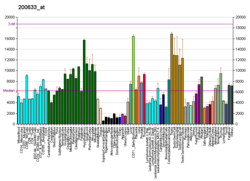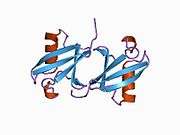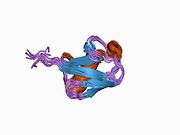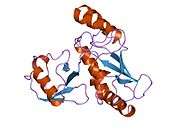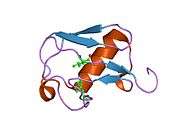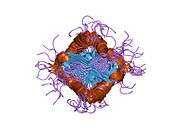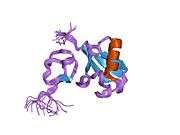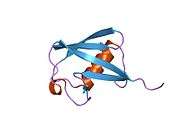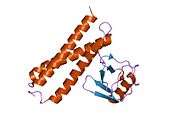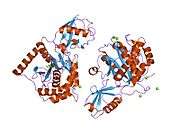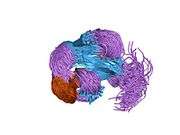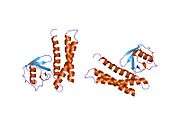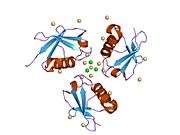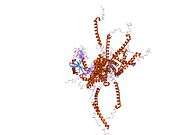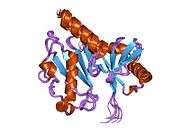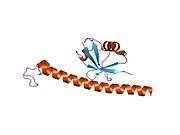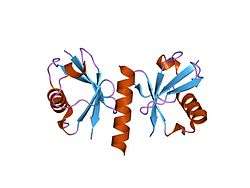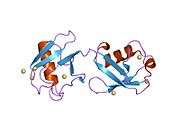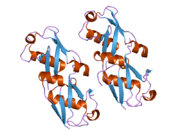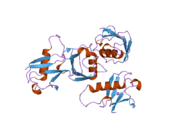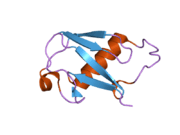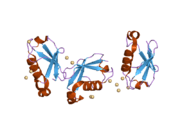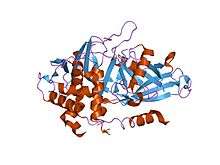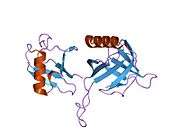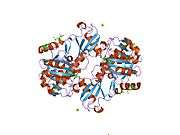| UBB |
|---|
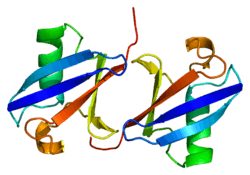 |
| Available structures |
|---|
| PDB | Human UniProt search: PDBe RCSB |
|---|
| List of PDB id codes |
|---|
2KHW, 2MBB, 2MRO, 2MSG, 4UEL, 4UF6, 4WLR, 4WUR, 4ZPZ, 5CAW, 3OJ3, 5DK8, 5CRA, 4ZFR, 5CVO, 3ZLZ, 4WHV, 4ZFT, 3ZNH, 5D0M, 2Y5B, 2KWV, 5D0K, 5DFL, 5CVM, 4WZP, 5EDV, 5CVN, 2KWU, 4XOF, 5BNB, 2N13, 4ZUX, 5IFR, 5IBK, 5KGF, 5JG6, 5K9P, 5E6J |
|
|
| Identifiers |
|---|
| Aliases | UBB, HEL-S-50, Ubiquitin B |
|---|
| External IDs | HomoloGene: 75104 GeneCards: UBB |
|---|
|
|
| Gene ontology |
|---|
| Molecular function | • protein binding
|
|---|
| Cellular component | • cytoplasm
• endocytic vesicle membrane
• cytosol
• mitochondrion
• neuron projection
• cell nucleus
• extracellular exosome
• plasma membrane
• nucleoplasm
• neuronal cell body
• endosome membrane
• extracellular space
• mitochondrial outer membrane
• endoplasmic reticulum quality control compartment
• vesicle
• endoplasmic reticulum membrane
• host cell
|
|---|
| Biological process | • DNA damage response, signal transduction by p53 class mediator resulting in cell cycle arrest
• negative regulation of epidermal growth factor receptor signaling pathway
• interstrand cross-link repair
• nucleotide-excision repair, DNA damage recognition
• positive regulation of canonical Wnt signaling pathway
• tumor necrosis factor-mediated signaling pathway
• regulation of type I interferon production
• positive regulation of protein monoubiquitination
• TRIF-dependent toll-like receptor signaling pathway
• Fc-epsilon receptor signaling pathway
• endosomal transport
• global genome nucleotide-excision repair
• NIK/NF-kappaB signaling
• G2/M transition of mitotic cell cycle
• stress-activated MAPK cascade
• negative regulation of ubiquitin-protein ligase activity involved in mitotic cell cycle
• transforming growth factor beta receptor signaling pathway
• macroautophagy
• negative regulation of canonical Wnt signaling pathway
• DNA damage response, detection of DNA damage
• nucleotide-excision repair, DNA gap filling
• error-free translesion synthesis
• regulation of tumor necrosis factor-mediated signaling pathway
• stimulatory C-type lectin receptor signaling pathway
• negative regulation of transforming growth factor beta receptor signaling pathway
• JNK cascade
• regulation of transcription from RNA polymerase II promoter in response to hypoxia
• nucleotide-excision repair, DNA incision
• I-kappaB kinase/NF-kappaB signaling
• innate immune response
• positive regulation of ubiquitin-protein ligase activity involved in regulation of mitotic cell cycle transition
• Notch signaling pathway
• neuron projection morphogenesis
• regulation of mRNA stability
• protein polyubiquitination
• negative regulation of apoptotic process
• negative regulation of transcription from RNA polymerase II promoter
• virion assembly
• positive regulation of intrinsic apoptotic signaling pathway by p53 class mediator
• activation of MAPK activity
• positive regulation of NF-kappaB transcription factor activity
• anaphase-promoting complex-dependent catabolic process
• negative regulation of type I interferon production
• nucleotide-binding oligomerization domain containing signaling pathway
• positive regulation of protein ubiquitination
• intracellular transport of virus
• regulation of proteasomal protein catabolic process
• viral life cycle
• MyD88-dependent toll-like receptor signaling pathway
• error-prone translesion synthesis
• MAPK cascade
• regulation of mitochondrial membrane potential
• fibroblast growth factor receptor signaling pathway
• ion transmembrane transport
• glycogen biosynthetic process
• regulation of neuron death
• positive regulation of apoptotic process
• positive regulation of I-kappaB kinase/NF-kappaB signaling
• translesion synthesis
• transcription-coupled nucleotide-excision repair
• mitochondrion transport along microtubule
• T cell receptor signaling pathway
• MyD88-independent toll-like receptor signaling pathway
• positive regulation of transcription from RNA polymerase II promoter
• regulation of signal transduction by p53 class mediator
• positive regulation of epidermal growth factor receptor signaling pathway
• Wnt signaling pathway
• nucleotide-excision repair, DNA duplex unwinding
• nucleotide-excision repair, DNA incision, 5'-to lesion
• ERBB2 signaling pathway
• Wnt signaling pathway, planar cell polarity pathway
• protein ubiquitination involved in ubiquitin-dependent protein catabolic process
• nucleotide-excision repair, preincision complex assembly
• proteasome-mediated ubiquitin-dependent protein catabolic process
• cellular protein metabolic process
• protein folding
• negative regulation of G2/M transition of mitotic cell cycle
• protein ubiquitination
• protein deubiquitination
• SCF-dependent proteasomal ubiquitin-dependent protein catabolic process
• entry of bacterium into host cell
• transmembrane transport
• regulation of necroptotic process
• membrane organization
• endoplasmic reticulum mannose trimming
• cellular iron ion homeostasis
• regulation of hematopoietic stem cell differentiation
|
|---|
| Sources:Amigo / QuickGO |
|
| Orthologs |
|---|
| Species | Human | Mouse |
|---|
| Entrez | | |
|---|
| Ensembl | | |
|---|
| UniProt | | |
|---|
| RefSeq (mRNA) | | |
|---|
| RefSeq (protein) | | |
|---|
| Location (UCSC) | Chr 17: 16.38 – 16.38 Mb | n/a |
|---|
| PubMed search | [2] | n/a |
|---|
| Wikidata |
|
Ubiquitin is a protein that in humans is encoded by the UBB gene.[3]
Function
Ubiquitin is one of the most conserved proteins known in eukaryotic organisms. Ubiquitin is required for ATP-dependent, non-lysosomal intracellular protein degradation of abnormal proteins and normal proteins with a rapid turnover. Ubiquitin is covalently bound to proteins to be degraded, and presumably labels these proteins for degradation. Ubiquitin also binds to histone H2A in actively transcribed regions but does not cause histone H2A degradation, suggesting that ubiquitin is also involved in regulation of gene expression. This gene consists of three direct repeats of the ubiquitin coding sequence with no spacer sequence. Consequently, the protein is expressed as a polyubiquitin precursor with a final amino acid after the last repeat. Aberrant form of this protein (UBB+1) has been noticed in patients with Alzheimer's disease, Down syndrome, other tauopathies (e.g. Pick's disease) and polyglutamine disease (e.g. Huntington's disease).[4][5]
References
- 1 2 3 GRCh38: Ensembl release 89: ENSG00000170315 - Ensembl, May 2017
- ↑ "Human PubMed Reference:".
- ↑ Webb GC, Baker RT, Fagan K, Board PG (Mar 1990). "Localization of the human UbB polyubiquitin gene to chromosome band 17p11.1-17p12". Am J Hum Genet. 46 (2): 308–15. PMC 1684968. PMID 2154095.
- ↑ Fischer DF, De Vos RA, Van Dijk R, De Vrij FM, Proper EA, Sonnemans MA, Verhage MC, Sluijs JA, Hobo B, Zouambia M, Steur EN, Kamphorst W, Hol EM, Van Leeuwen FW (Nov 2003). "Disease-specific accumulation of mutant ubiquitin as a marker for proteasomal dysfunction in the brain". FASEB J. 17 (14): 2014–2024. doi:10.1096/fj.03-0205com. PMID 14597671.
- ↑ "Entrez Gene: UBB ubiquitin B".
Further reading
- Conaway RC, Brower CS, Conaway JW (2002). "Emerging roles of ubiquitin in transcription regulation". Science. 296 (5571): 1254–1258. doi:10.1126/science.1067466. PMID 12016299.
- Murphey RK, Godenschwege TA (2002). "New roles for ubiquitin in the assembly and function of neuronal circuits". Neuron. 36 (1): 5–8. doi:10.1016/S0896-6273(02)00943-1. PMID 12367500.
- Mazzé FM, Degrève L (2006). "The role of viral and cellular proteins in the budding of human immunodeficiency virus". Acta Virol. 50 (2): 75–85. PMID 16808324.
- Schlesinger DH, Goldstein G (1975). "Molecular conservation of 74 amino acid sequence of ubiquitin between cattle and man". Nature. 255 (5507): 423–4. doi:10.1038/255423a0. PMID 1128706.
- Adams SM, Sharp MG, Walker RA, et al. (1992). "Differential expression of translation-associated genes in benign and malignant human breast tumours". Br. J. Cancer. 65 (1): 65–71. doi:10.1038/bjc.1992.12. PMC 1977345. PMID 1370760.
- Pancré V, Pierce RJ, Fournier F, et al. (1991). "Effect of ubiquitin on platelet functions: possible identity with platelet activity suppressive lymphokine (PASL)". Eur. J. Immunol. 21 (11): 2735–41. doi:10.1002/eji.1830211113. PMID 1657614.
- Baker RT, Board PG (1991). "The human ubiquitin-52 amino acid fusion protein gene shares several structural features with mammalian ribosomal protein genes". Nucleic Acids Res. 19 (5): 1035–1040. doi:10.1093/nar/19.5.1035. PMC 333777. PMID 1850507.
- Fornace AJ, Alamo I, Hollander MC, Lamoreaux E (1989). "Ubiquitin mRNA is a major stress-induced transcript in mammalian cells". Nucleic Acids Res. 17 (3): 1215–1230. doi:10.1093/nar/17.3.1215. PMC 331738. PMID 2537950.
- Lund PK, Moats-Staats BM, Simmons JG, et al. (1985). "Nucleotide sequence analysis of a cDNA encoding human ubiquitin reveals that ubiquitin is synthesized as a precursor". J. Biol. Chem. 260 (12): 7609–13. PMID 2581967.
- Einspanier R, Sharma HS, Scheit KH (1987). "Cloning and sequence analysis of a cDNA encoding poly-ubiquitin in human ovarian granulosa cells". Biochem. Biophys. Res. Commun. 147 (2): 581–587. doi:10.1016/0006-291X(87)90970-3. PMID 2820408.
- Wiborg O, Pedersen MS, Wind A, et al. (1985). "The human ubiquitin multigene family: some genes contain multiple directly repeated ubiquitin coding sequences". EMBO J. 4 (3): 755–9. PMC 554252. PMID 2988935.
- Baker RT, Board PG (1987). "The human ubiquitin gene family: structure of a gene and pseudogenes from the Ub B subfamily". Nucleic Acids Res. 15 (2): 443–463. doi:10.1093/nar/15.2.443. PMC 340445. PMID 3029682.
- Vijay-Kumar S, Bugg CE, Cook WJ (1987). "Structure of ubiquitin refined at 1.8 A resolution". J. Mol. Biol. 194 (3): 531–544. doi:10.1016/0022-2836(87)90679-6. PMID 3041007.
- Busch H (1984). "Ubiquitination of proteins". Meth. Enzymol. Methods in Enzymology. 106: 238–262. doi:10.1016/0076-6879(84)06025-0. ISBN 978-0-12-182006-0. PMID 6092831.
- Andersen MW, Ballal NR, Goldknopf IL, Busch H (1981). "Protein A24 lyase activity in nucleoli of thioacetamide-treated rat liver releases histone 2A and ubiquitin from conjugated protein A24". Biochemistry. 20 (5): 1100–1104. doi:10.1021/bi00508a009. PMID 6261785.
- Busch H, Goldknopf IL (1982). "Ubiquitin - protein conjugates". Mol. Cell. Biochem. 40 (3): 173–87. doi:10.1007/bf00224611. PMID 6275256.
- Treier M, Staszewski LM, Bohmann D (1994). "Ubiquitin-dependent c-Jun degradation in vivo is mediated by the delta domain". Cell. 78 (5): 787–798. doi:10.1016/S0092-8674(94)90502-9. PMID 8087846.
- Cook WJ, Jeffrey LC, Kasperek E, Pickart CM (1994). "Structure of tetraubiquitin shows how multiubiquitin chains can be formed". J. Mol. Biol. 236 (2): 601–609. doi:10.1006/jmbi.1994.1169. PMID 8107144.
- Ramage R, Green J, Muir TW, et al. (1994). "Synthetic, structural and biological studies of the ubiquitin system: the total chemical synthesis of ubiquitin". Biochem. J. 299 (1): 151–8. PMC 1138034. PMID 8166633.
PDB gallery |
|---|
1aar: STRUCTURE OF A DIUBIQUITIN CONJUGATE AND A MODEL FOR INTERACTION WITH UBIQUITIN CONJUGATING ENZYME (E2) 1cmx: STRUCTURAL BASIS FOR THE SPECIFICITY OF UBIQUITIN C-TERMINAL HYDROLASES 1d3z: UBIQUITIN NMR STRUCTURE 1f9j: STRUCTURE OF A NEW CRYSTAL FORM OF TETRAUBIQUITIN 1fxt: STRUCTURE OF A CONJUGATING ENZYME-UBIQUITIN THIOLESTER COMPLEX 1g6j: STRUCTURE OF RECOMBINANT HUMAN UBIQUITIN IN AOT REVERSE MICELLES 1gjz: SOLUTION STRUCTURE OF A DIMERIC N-TERMINAL FRAGMENT OF HUMAN UBIQUITIN 1nbf: Crystal structure of a UBP-family deubiquitinating enzyme in isolation and in complex with ubiquitin aldehyde 1ogw: SYNTHETIC UBIQUITIN WITH FLUORO-LEU AT 50 AND 67 1otr: Solution Structure of a CUE-Ubiquitin Complex 1p3q: Mechanism of Ubiquitin Recognition by the CUE Domain of VPS9 1q0w: Solution structure of Vps27 amino-terminal UIM-ubiquitin complex 1q5w: Ubiquitin Recognition by Npl4 Zinc-Fingers 1s1q: TSG101(UEV) domain in complex with Ubiquitin 1sif: Crystal structure of a multiple hydrophobic core mutant of ubiquitin 1tbe: STRUCTURE OF TETRAUBIQUITIN SHOWS HOW MULTIUBIQUITIN CHAINS CAN BE FORMED 1ubi: SYNTHETIC STRUCTURAL AND BIOLOGICAL STUDIES OF THE UBIQUITIN SYSTEM. PART 1 1ubq: STRUCTURE OF UBIQUITIN REFINED AT 1.8 ANGSTROMS RESOLUTION 1ud7: SOLUTION STRUCTURE OF THE DESIGNED HYDROPHOBIC CORE MUTANT OF UBIQUITIN, 1D7 1uzx: A COMPLEX OF THE VPS23 UEV WITH UBIQUITIN 1v80: Solution structures of ubiquitin at 30 bar and 3 kbar 1v81: Solution structures of ubiquitin at 30 bar and 3 kbar 1wr1: The complex structure of Dsk2p UBA with ubiquitin 1wr6: Crystal structure of GGA3 GAT domain in complex with ubiquitin 1wrd: Crystal structure of Tom1 GAT domain in complex with ubiquitin 1xd3: Crystal structure of UCHL3-UbVME complex 1xqq: Simultaneous determination of protein structure and dynamics 1yd8: COMPLEX OF HUMAN GGA3 GAT DOMAIN AND UBIQUITIN 1yiw: X-ray Crystal Structure of a Chemically Synthesized Ubiquitin 1yj1: X-ray Crystal Structure of a Chemically Synthesized [D-Gln35]Ubiquitin 1yx5: Solution Structure of S5a UIM-1/Ubiquitin Complex 1yx6: Solution Structure of S5a UIM-2/Ubiquitin Complex 1zgu: Solution structure of the human Mms2-Ubiquitin complex 2ayo: Structure of USP14 bound to ubquitin aldehyde 2bgf: NMR STRUCTURE OF LYS48-LINKED DI-UBIQUITIN USING CHEMICAL SHIFT PERTURBATION DATA TOGETHER WITH RDCS AND 15N-RELAXATION DATA 2c7m: HUMAN RABEX-5 RESIDUES 1-74 IN COMPLEX WITH UBIQUITIN 2c7n: HUMAN RABEX-5 RESIDUES 1-74 IN COMPLEX WITH UBIQUITIN 2d3g: Double sided ubiquitin binding of Hrs-UIM 2den: Solution Structure of the Ubiquitin-Associated Domain of Human BMSC-UbP and its Complex with Ubiquitin 2dx5: The complex structure between the mouse EAP45-GLUE domain and ubiquitin 2fcm: X-ray Crystal Structure of a Chemically Synthesized [D-Gln35]Ubiquitin with a Cubic Space Group 2fcn: X-ray Crystal Structure of a Chemically Synthesized [D-Val35]Ubiquitin with a Cubic Space Group 2fcq: X-ray Crystal Structure of a Chemically Synthesized Ubiquitin with a Cubic Space Group 2fcs: X-ray Crystal Structure of a Chemically Synthesized [L-Gln35]Ubiquitin with a Cubic Space Group 2fid: Crystal Structure of a Bovine Rabex-5 fragment complexed with ubiquitin 2fif: Crystal Structure of a Bovine Rabex-5 fragment complexed with ubiquitin 2fuh: Solution Structure of the UbcH5c/Ub Non-covalent Complex 2g3q: Solution Structure of Ede1 UBA-ubiquitin complex 2g45: Co-crystal structure of znf ubp domain from the deubiquitinating enzyme isopeptidase T (isot) in complex with ubiquitin 2gbj: Crystal Structure of the 9-10 8 Glycine Insertion Mutant of Ubiquitin. 2gbk: Crystal Structure of the 9-10 MoaD Insertion Mutant of Ubiquitin 2gbm: Crystal Structure of the 35-36 8 Glycine Insertion Mutant of Ubiquitin 2gbn: Crystal Structure of the 35-36 8 Glycine Insertion Mutant of Ubiquitin 2gbr: Crystal Structure of the 35-36 MoaD Insertion Mutant of Ubiquitin 2gmi: Mms2/Ubc13~Ubiquitin 2hd5: USP2 in complex with ubiquitin 2hth: Structural basis for ubiquitin recognition by the human EAP45/ESCRT-II GLUE domain 2ibi: Covalent Ubiquitin-USP2 Complex 2j7q: CRYSTAL STRUCTURE OF THE UBIQUITIN-SPECIFIC PROTEASE ENCODED BY MURINE CYTOMEGALOVIRUS TEGUMENT PROTEIN M48 IN COMPLEX WITH A UBQUITIN-BASED SUICIDE SUBSTRATE 2nr2: The MUMO (minimal under-restraining minimal over-restraining) method for the determination of native states ensembles of proteins 2o6v: Crystal structure and solution NMR studies of Lys48-linked tetraubiquitin at neutral pH 2oob: crystal structure of the UBA domain from Cbl-b ubiquitin ligase in complex with ubiquitin |



